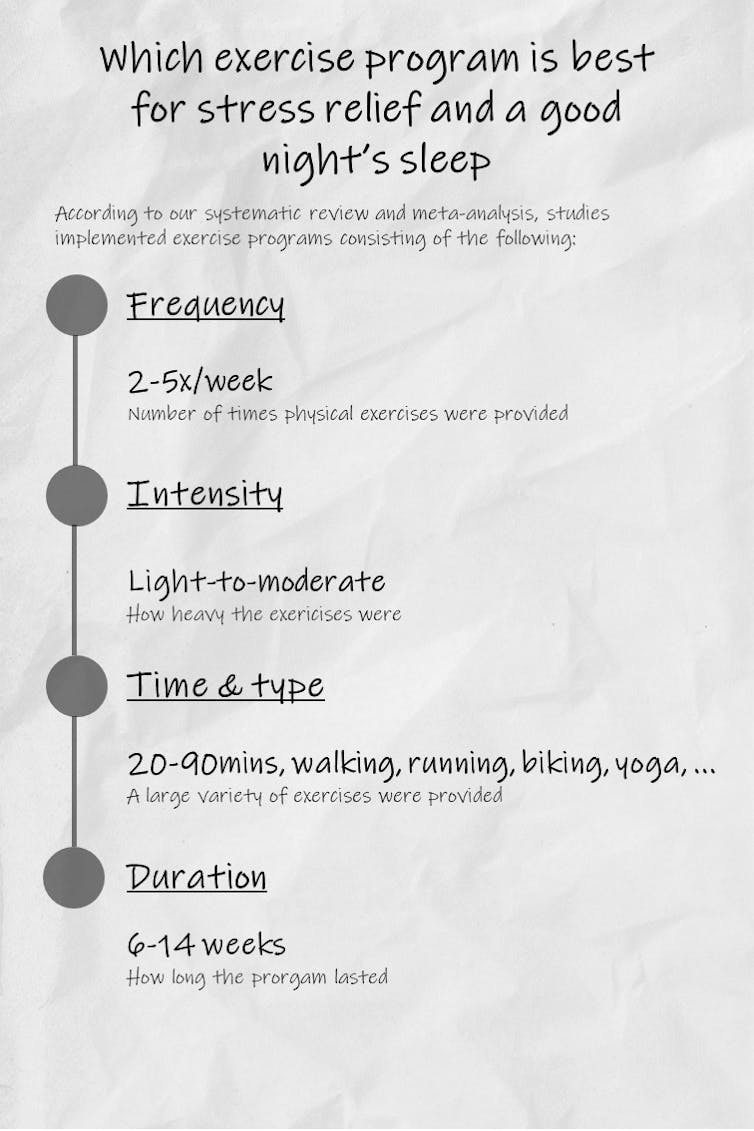
When you’re suffering from stress, it can affect almost every aspect of your life – even down to how well you sleep at night. While it’s normal to experience stress over things every now and again, if it continues to affect your sleep in the long-term it can lead to poorer quality sleep and even insomnia.
This may, in turn, lead to other health problems, such as depression, cancer relapse and early death.
But our recent review suggests that physical activity may be key to improving both stress levels and sleep.
To conduct our review, we looked at all possible studies ever published on this topic. Around 60% of the studies we looked at happened to be done on women with breast cancer, while the other 40% were done on a more diverse range of participants, including men and women without breast cancer. It’s uncertain why so many studies in this area looked at women with breast cancer, but it may be to do with the fact that chemotherapy causes a lot of side effects – such as stress and poor sleep.
Our findings suggest that, in general, exercise was effective for reducing stress levels and improving sleep. Other studies that have looked at a more diverse group of participants have also shown that physical activity can help lower stress and can help people get a better night’s sleep. Research also suggests exercise may be beneficial for people with other health conditions such as depression or sleep disturbances.
Cortisol is an essential hormone in the body. It works with our brain to regulate a number of important body processes including mood, immune system function and metabolism. It also triggers our “fight-or-flight” response when we encounter things that are scary or stressful – hence why it’s often called our “stress hormone”.
Cortisol also plays an important role in sleep. Cortisol levels change throughout the day, but are generally at their peak in the morning, around 30-45 minutes after waking up, helping us feel alert and ready to take on the day. But gradually these levels decline throughout the day, which helps us feel tired and fall asleep at night.
But in times of stress you may experience higher cortisol levels in the evening – which makes it harder to get a good night’s sleep. Poor sleep in turn increases stress by affecting the way the body produces cortisol.
According to our review, physical activity counterbalances this negative spiral by regulating cortisol levels – which simultaneously improves sleep quality. We found that light-to-moderate intensity exercise (such as running and yoga) seem to be the most beneficial in improving stress and sleep. But our study also suggests that exercise works best at reducing stress and improving sleep when it’s tailored to each person’s preference.

Why exercise works
Previous research suggests a couple of possible reasons why exercise is so good for reducing stress and improving sleep.
First, exercise can be seen as a “hormetic” stressor. Hormesis is that sort of good stress that keeps your body alert. During exercise, your body is exposed to various forms of stress – such as the stress your muscles experience because of the extra demand placed on them. These stressors simulate existing mechanisms that your body uses to withstand greater stress.
Either too little or too much exposure to exercise stressors can lead to poor health. It’s that sweet spot that regulates cortisol and improve sleep (and overall health). But this sweet spot differs from person to person – and may even be affected by your own mental state when you exercise.
Second, it’s important to consider the type of exercise you do – as this can determine whether or not it makes you feel relaxed or more stressed. This is why it’s essential that you enjoy the exercise you do. You may also want to change the intensity of the exercise you do depending on the time of day.
Since exercise releases cortisol (especially more intense types of exercise, such as weightlifting or high-intensity interval training), morning exercise can help your body feel more energised during the day and help you feel more tired in the evening. For this same reason, if you’re someone who likes to exercise in the evening it’s best to choose exercises – such as yoga or tai chi – that help you wind down and don’t spike cortisol levels too much.
But of course, not everyone can exercise first thing in the morning. The good news is that exercise almost any time of day can help reduce your stress levels and improve sleep – and this is true of almost every type of exercise, too.
Anna Catriona Whittaker receives funding from UKRI-ESRC. She is affiliated with Christadelphian Care Homes and Christadelphian Support Network as a Trustee.
Len De Nys does not work for, consult, own shares in or receive funding from any company or organisation that would benefit from this article, and has disclosed no relevant affiliations beyond their academic appointment.
* This article was originally published at The Conversation
PUBLISH WITH US!
The Washington Gazette works at our discretion with businesses, non-profits, and other organizations. We do not work with socialists, crony capitalists, or disinformation groups. Click the green button below to view our services!
HELP STOP THE SPREAD OF FAKE NEWS!
SHARE our articles and like our Facebook page and follow us on Twitter!




0 Comments